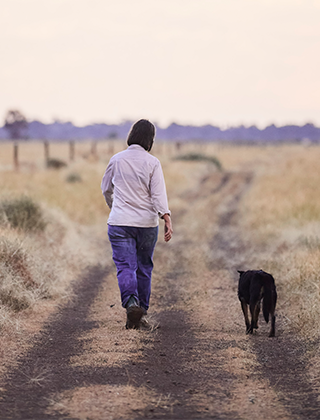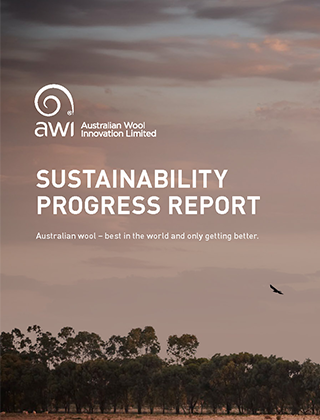Commonwealth Government supports AWI’s groundbreaking Woolmark+ insetting program
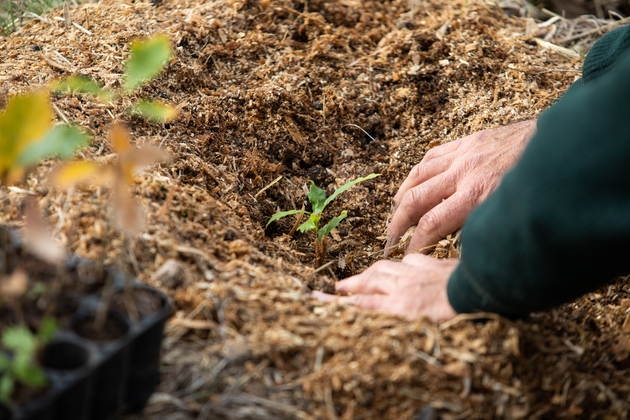
AWI welcomes a $4 million grant from the Australian Government to kickstart its ground-breaking Australian Wool Industry Insetting Program as part of the recently unveiled Woolmark+ roadmap.
The program will connect fashion and textile brands with Australian woolgrowers looking to reduce emissions through nature-based solutions, with AWI and its subsidiary, Woolmark, spearheading the industry’s move towards nature positive outcomes.
This industry-first initiative will develop and trial an insetting framework, aimed at enabling emissions reductions within the textile supply chain.
The strategic partnership between AWI, Pollination, and Landcare Australia creates a comprehensive approach to implement, report, and scale insetting to enable woolgrowers to reduce greenhouse gas (GHG) emissions through nature-based solutions on farm.
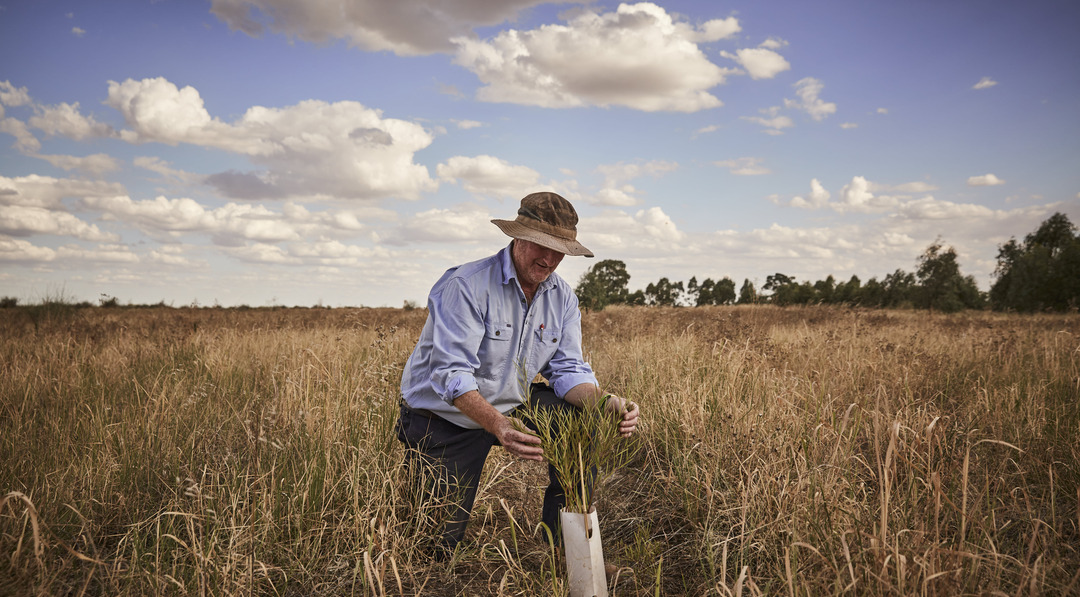
A key element will be the creation of a mechanism to facilitate the connection between global fashion and textile brands and woolgrowers with GHG emission reductions on Australian wool-growing properties, which in turn can reduce the brand’s scope 3 emissions within the value chain.
“We want to offer woolgrowers an option and brands a solution that allows emissions reductions to remain within the textile supply chain,” said AWI CEO John Roberts. “Brands are increasingly seeking ways to address their scope 3 emissions, but scaling these efforts has been a challenge. Insetting presents an exciting opportunity for brands to meet their emissions targets in a way that aligns with the Science Based Targets initiative (SBTi) while simultaneously supporting Australian woolgrowers. We’re grateful to the Australian government for their support of this game-changing initiative.”
The project aims to break down significant barriers woolgrowers face when engaging in environmental markets and reducing GHG emissions, including the lack of guidance on best practices, upfront capital, and market engagement. By addressing these challenges, this initiative will provide woolgrowers with some of the tools needed to manage more than 65 million hectares of Australian land more sustainably, setting the stage for impactful emissions reductions across the wool value chain.
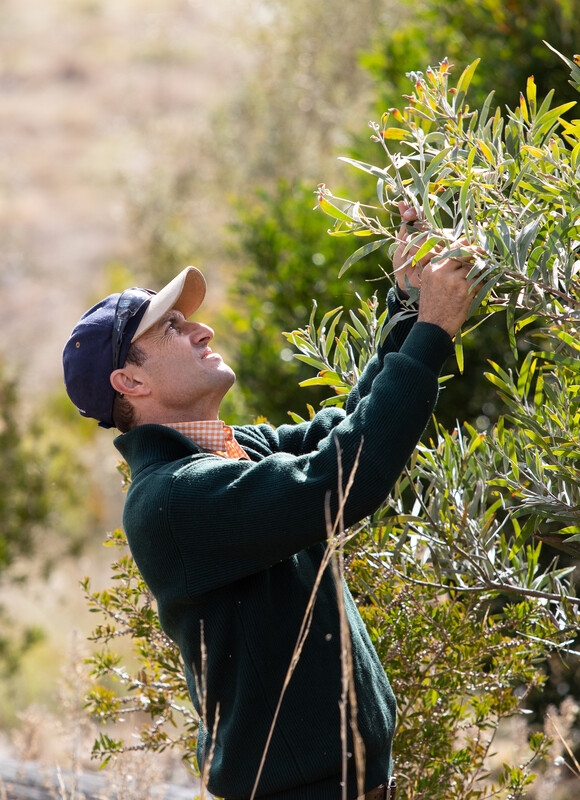
“By supporting nature-based solutions such as environmental plantings and best-practice flock management, the project will lay the foundation for scalable, high-integrity emissions reductions that deliver environmental and economic benefits for Australian woolgrowers,” said Lara Phillips, Director at Pollination.
Landcare Australia, a not-for-profit organisation driving improved environmental land management for more than 35 years, is excited about this groundbreaking project.
“Supporting woolgrowers to understand their opportunities in emerging environmental markets as well as providing on-ground implementation support for environmental plantings will help reduce emissions while increasing biodiversity within the wool value chain,” said Landcare Australia CEO Dr Shane Norrish.
The Australian Wool Industry Insetting Program is supported by the Australian Government through funding from the Climate-Smart Agriculture Program under the Natural Heritage Trust.
Images are available here: Woolmark+ Insetting Program Launch
Get involved
AWI is inviting Australian woolgrowers, along with global fashion and textile brands, to collaborate in achieving GHG reductions.
Interested woolgrowers are invited to contact us at woolmarkplus@wool.com to get involved or for more information.
About Pollination:
Pollination is a global climate change investment and advisory firm dedicated to accelerating the transition to a net-zero, nature positive future. Launched in 2019, the organisation has a presence in 13 countries across The Americas, EMEA and Asia Pacific. The Pollination team includes global leaders in finance, investments, technology, business, law and policy. Harnessing the team’s diverse expertise, Pollination helps government, business, and public and private capital to navigate the climate transition, designing and investing in breakthrough ideas that deliver financial returns.
About Landcare Australia:
Landcare Australia is a national not-for-profit organisation established 35 years ago, that supports the Landcare community with funding, capacity-building, on-ground projects, information, networking and promotion of Landcare achievements. Landcare Australia also delivers major land restoration projects and manages multiple programs that support nature-based carbon solutions, sustainable agriculture, emerging environmental markets, youth, First Nations people, Junior Landcare and Coastcare. Across Australia, our partnerships support thousands of people involved in Landcare who are working to protect local ecosystems that contribute to the sustainability and productivity of our land and water assets. Together with the Landcare community, our efforts improve biodiversity, build resilience in Australia’s food and farming systems, and create stronger communities. Landcare enables people to actively care for the natural environment in their community through sustainable land management and conservation activities. For more information, please visit www.landcareaustralia.org.au
FAQs
What is insetting?
Insetting refers to initiatives that occur within a company’s value chain to reduce the environmental footprint directly related to the company’s business activities. To date, insetting has been used to incentivise Scope 3 GHG emissions reductions and removals however, insetting could be used as a mechanism to reduce a company’s impact on nature more broadly.
What is the Woolmark+ Insetting Program?
The Woolmark+ Insetting Program connects brands with Scope 3 emission reduction targets to woolgrowers. Woolgrowers gain new revenue streams while helping their value chain cut Scope 3 emissions.
What are the Woolmark+ Insetting Program’s objectives?
Through insetting, we’re seeking to bridge the gap between supply and demand for value chain emissions reductions through reduction and removal activities on wool farms, ultimately accelerating nature positive action.
What are some reductions and removals example activities on wool-growing farms?
- Native Mixed-Species Environmental Plantings: Direct seeding of locally appropriate native trees and shrubs in block and/or shelterbelt plantings.
- Feed Supplementation: Dietary supplementation of grazing sheep flock with feed supplements that reduce enteric methane emissions.
- Flock Productivity: Livestock management strategies can cut emissions by reducing either emissions intensity (emissions per unit of output) or the amount of methane an animal produces. These strategies may include using feed additives, breeding earlier, keeping high-performing animals, improving fertility, enhancing animal health and welfare, selecting low-methane-producing animals, and growing methane-reducing pastures.
What is the cost of participation?
Brands will provide a participation fee through the investment and advisory firm partner and will have the option to further scale their investment based on the scale of impact they require. The return on the finance provided by the brand will be emissions reductions and associated co-benefits.
Can brands choose the wool-growing farm that participates?
The wool-growing properties will meet the required criteria as defined by the members of the project including participating brands. Input from brands will be sought as part of this process.
Will the emissions reductions be attached to the wool?
This project is designed to trial best-practice insetting within the wool value chain. The emissions reductions could either be attached to the wool if in a fully traceable system or be a separate transaction in a supply-shed approach which may be explored.
How can the emissions reductions be traceable?
There are several options which can be explored as part of the pilot.
How will the activities on farm be monitored and verified?
An independent third-party verifier will monitor and report on the emissions reductions achieved.






